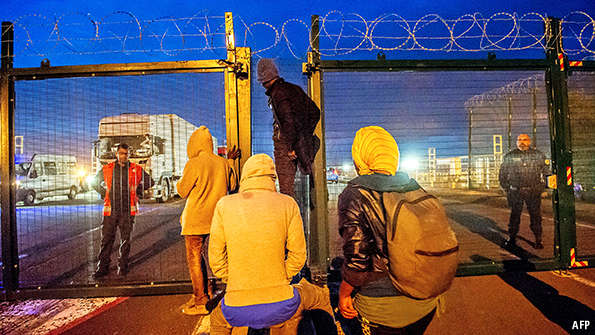PBS: Escaping Eritrea … [Read More...] about ካብ ውሽጢ ቤት ማእሰርታት ኤርትራ
Learning from the Jungle
Aug 8th 2015 | CALAIS | THE ECONOMIST
The camp at the Channel’s edge is a sideshow in Europe’s migrant crisis, but it offers important lessons
A TINY African girl breaks into a jig as an Arabic pop song gives way to the cheerful soul of Pharrell Williams’s “Happy”, scourge of parents everywhere. It is an incongruous sound for the Jungle, a squalid migrant camp on the outskirts of Calais. But the Jungle is an incongruous place: a shanty-town of thousands of the earth’s wretched, assembled with the tacit approval of local authorities in one of the richest parts of the planet. “You’re telling me this is Europe?” says a frustrated Syrian teenager, gesturing at the filth before him.

Along with most of the Jungle’s inhabitants, he has his eyes on Britain, across the English Channel. A recent spike in the number of migrants in Calais attempting to clamber onto trains or lorries bound for Britain has spooked politicians on both sides of the water. Fences have been erected and extra police dispatched. A dozen migrants have died attempting to make the crossing since June. For some, Calais is a microcosm of the migration crisis that has erupted across Europe this year, from Greek islands to Hungary’s border with Serbia. (In the latest disaster, scores are feared to have died after a boat capsized off the Libyan coast on August 4th.)
Yet if the Jungle is an example, it is not a particularly telling one. The estimated 3,000 people in the camp amount to between 1% and 2% of the illegal immigrants who have reached the European Union by sea this year alone. Volunteers in the camp say its overall size has not grown appreciably, even as record numbers reach Europe. Migrants crossing the Mediterranean are more likely to head for countries like Germany or Sweden. By no conceivable measure is either France or Britain on the frontline of Europe’s migration crisis.
Yet as Europe’s leaders scramble to assemble a migration policy, they could draw two lessons from Calais. The first is that even small numbers can cause big political headaches at pinch points. The few hundred that try (and usually fail) to sneak across the Channel each night pale next to the numbers of illegal immigrants in Britain who have overstayed their visas. But the dramatic images suggest that politicians are not in control of their own borders, a message toxic enough to force changes in government policy.
The second lesson is that many migrants will take big risks to reach one European country over another. Most of the Jungle’s inhabitants have trudged right across Europe, taking advantage of its Schengen passport-free rules, to arrive in Calais. As they slipped through rich countries with an obligation to consider asylum claims, refugees in effect became economic migrants. Asif, an enterprising Afghan who has set up a small grocery shop in the camp, says he has already been granted asylum in Italy. Yet he was unable to find work there, and so he, along with most of his fellow Jungle-dwellers, will continue to seek a brighter future in Britain.
Brussels should take note. Under a new EU proposal to lift the burden from frontline countries, from this autumn asylum-seekers from Syria, Eritrea and Iraq who arrive in Italy or Greece will be relocated to other European countries to have their claims assessed. But the condition of asylum will be an obligation to stay put. None of the migrants your correspondent spoke to had heard of the EU plan. Nor did they seem keen on the idea of a forced move to countries they may not have heard of, even if it comes with a home and benefits attached. One migrant who claims to have been mistreated by Bulgarian police sniffs at the idea of being sent back there: “Why would I want to live in a poor country when I’ve already left one?” But the EU’s plan will only work if such “secondary migration” is kept to a minimum.
For now, the inhabitants of the Jungle are locked in a familiar game of cat-and-mouse. The security measures the French and British governments have deployed will put some off. They may also endanger those who remain undeterred: Médecins du Monde, a charity, says its efforts are increasingly devoted to healing the hand and foot wounds of those who have tried to scale fences and chase lorries.
